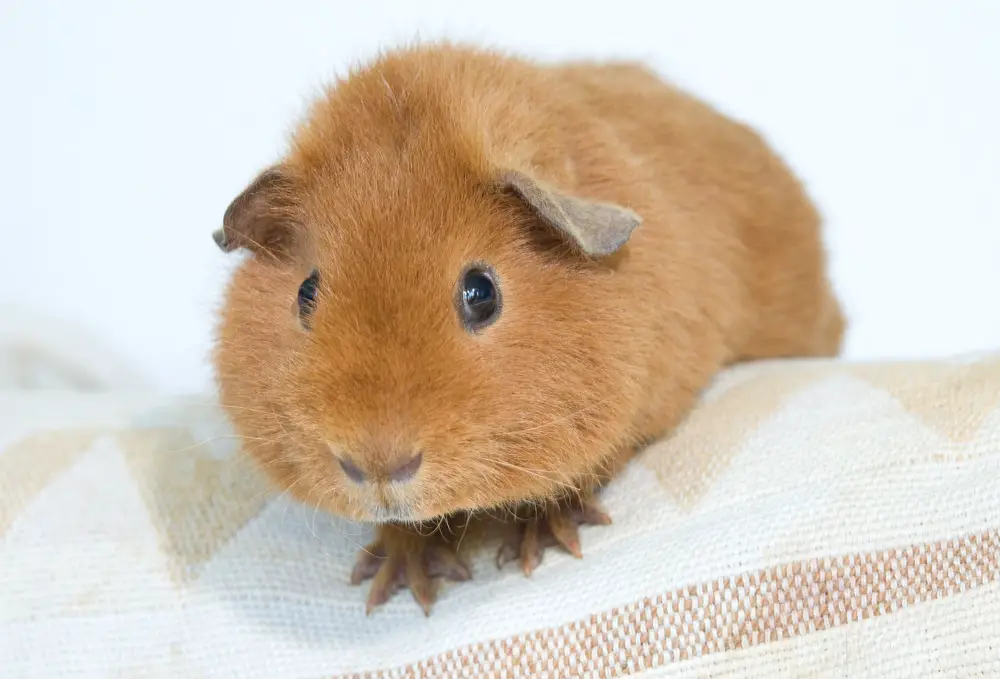Introduction
Are Guinea Pigs Hypoallergenic: The endearing charm of guinea pigs makes them irresistible companions in the world of small pets. Their gentle demeanor, soft fur, and friendly disposition make them a popular choice among animal enthusiasts. However, as with any pet, there are essential considerations to ponder before bringing these adorable rodents into your home. One such question that frequently arises is whether guinea pigs are hypoallergenic.
Navigating the world of pets can be a thrilling adventure, with each species offering its unique charm and companionship. Guinea pigs, with their gentle disposition and adorable appearance, have long been cherished as delightful additions to many households. Yet, as we consider inviting these endearing rodents into our lives, a pertinent question often arises.
Allergies can be a significant factor influencing our choice of pets, and understanding the potential allergenicity of guinea pigs is crucial. While they are not as commonly associated with allergies as cats or dogs, guinea pigs are not entirely immune to posing allergenic challenges. In this exploration, we embark on a journey to unravel the mysteries surrounding guinea pig allergies and hypoallergenic claims.

Can guinea pig hair cause allergies?
It’s a common misconception that guinea pig’s hair is the source of the allergic reaction, which actually is not the case. The allergens (materials that you are allergic to) are contained within guinea pig saliva, urine and gland secretions.
Yes, guinea pig hair can potentially cause allergies in some individuals, although they are generally considered a hypoallergenic pet compared to cats or dogs. Guinea pig allergies are primarily triggered by proteins found in their saliva, urine, and skin cells, rather than their hair. However, it’s essential to understand that allergic reactions can vary from person to person.
The protein responsible for most guinea pig allergies is called “Gp1,” which is found in their skin cells and saliva. When guinea pigs groom themselves, this protein can transfer to their hair, leading to the misconception that their fur causes allergies. When guinea pigs shed their hair, these allergenic proteins can become airborne, potentially triggering allergic reactions when inhaled by sensitive individuals.
Guinea pig allergies may include sneezing, runny or stuffy nose, itchy or watery eyes, skin rashes, and even respiratory issues in severe cases. To minimize the risk of allergies, regular grooming and cage cleaning can help reduce the amount of allergenic proteins in the environment. Additionally, using HEPA air purifiers and maintaining proper ventilation in the guinea pig’s living area can also mitigate allergen exposure.
What is the most hypoallergenic guinea pig?
Warm-blooded animals with fur, hair, or feathers can cause allergic reactions in human beings, and guinea pigs are no different. You may have heard that some ‘special’ guinea pig breeds with no hair or fur may be hypoallergenic, but there are no hypoallergenic guinea pigs.
When it comes to guinea pigs and allergenicity, breed is entirely hypoallergenic. Guinea pigs primarily trigger allergies through proteins found in their saliva, urine, and skin cells rather than their fur. Therefore, the notion of one guinea pig breed being significantly more hypoallergenic than another is somewhat misleading. However, there are certain characteristics and practices that can help minimize the risk of allergies for potential guinea pig owners.
Guinea pigs are often favored by individuals with allergies because their fur is less likely to trap and carry allergenic particles. Additionally, keeping guinea pig enclosures meticulously clean, using high-efficiency particulate air (HEPA) filters, and maintaining good ventilation can all contribute to a more allergy-friendly environment.
It’s crucial to understand that allergies vary from person to person. What might trigger allergies in one individual may not affect another. Before adopting a guinea pig, spending time around them to gauge your personal reaction is advisable, especially if you have a history of allergies.
In essence, while there may be no single “most hypoallergenic” guinea pig breed, responsible care practices and choosing short-haired guinea pigs can help minimize allergen exposure and create a more comfortable living environment for both the pets and their owners.
Can you have a guinea pig if you have allergies?
A guinea pig is a fairly safe bet for most people with allergies. If you find that a regular guinea pig causes some allergy symptoms, you might opt for a hairless guinea pig. Hairless guinea pigs actually do have hair that some people call peach fuzz.
It does require careful consideration and management. Guinea pigs are not inherently hypoallergenic, as they can produce allergenic proteins in their saliva, urine, and skin cells. However, many individuals with allergies successfully share their lives with guinea pigs by taking certain precautions.
Test Exposure: Spend time around guinea pigs before bringing one into your home. This can help you assess your sensitivity to allergens produced by these pets.
Choose Short-Haired Breeds: Short-haired guinea pigs are often favored because their fur is less likely to trap allergens compared to long-haired breeds.
Keep the Environment Clean: Regularly clean your guinea pig’s cage and surrounding area to minimize allergen buildup. Use a HEPA air purifier to help filter allergenic particles from the air.
Wash Hands After Handling: After interacting with your guinea pig, wash your hands thoroughly to remove allergens.
Consider Medication: Over-the-counter or prescribed allergy medications can help manage symptoms if you have a mild allergy.
Consult an Allergist: If you have severe allergies, consider consulting an allergist for personalized advice and potential immunotherapy options.
Can guinea pigs cause skin allergies?
As household pets, guinea pigs are less common than cats and dogs, but they are just as likely to cause allergies in hypersensitive individuals. A protein in the animal’s saliva and urine is the primary source of guinea pig allergens, but the protein can also be transferred to the guinea pig’s fur, skin, and dander.
Guinea pigs themselves do not typically cause skin allergies directly. The primary way guinea pigs might be linked to skin allergies is through the allergenic proteins found in their skin cells and saliva.
Allergenic Proteins: Guinea pigs produce allergenic proteins, such as Gp1, which are found in their skin cells and saliva. When you handle a guinea pig, these proteins can transfer to your skin. If you are sensitive or allergic to these proteins, it may lead to skin irritation, redness, or itching.
Scratching or Biting: Guinea pigs have small, sharp claws and teeth. If they scratch or nibble on your skin, it can cause minor abrasions or small cuts. These openings in the skin can potentially lead to skin irritations or infections, especially if not properly cleaned.
Handling and Hygiene: Proper handwashing after handling guinea pigs is crucial to minimize the risk of skin irritation. Maintaining good hygiene practices for your guinea pig’s living area can help prevent any skin-related issues.
Can you test for guinea pig allergy?
This IgE allergy test uses a blood sample to determine if you are allergic to Guinea Pig Epithelia (skin cells/tissue).
Yes, you can test for a guinea pig allergy through various methods, just as you would for other allergens. If you suspect you might be allergic to guinea pigs or are experiencing allergy-like symptoms after being around them, here are some steps to consider:
Consult an Allergist: The most reliable way to diagnose a guinea pig allergy is to consult an allergist or immunologist. They can perform specific tests to determine if you are allergic to guinea pig allergens, such as proteins found in their skin cells, saliva, or urine.
a. Skin Prick Test: This involves placing a small amount of guinea pig allergen on your skin, typically on your forearm, and then pricking or scratching the skin to allow the allergen to enter. If you are allergic, you may develop a localized allergic reaction, such as redness or a raised bump.
b. Blood Test: A blood test can measure the level of antibodies in your blood, specifically IgE antibodies, which are produced in response to allergens. Elevated levels of IgE antibodies to guinea pig allergens can indicate an allergy.
Elimination Test: If formal allergy tests are inconclusive or unavailable, you can try an elimination test. Remove contact with guinea pigs for a period and observe if your symptoms improve. Then, reintroduce contact, and if your symptoms worsen, it may suggest an allergy.
Do guinea pigs smell?
In a nutshell, guinea pigs shouldn’t smell. If they are giving off an unpleasant odor, it’s usually a sign that the cage isn’t clean, their diet is wrong, they’re sick, or they’re struggling to groom themselves. Also, boars may smell more than sows because of an oily buildup around the grease gland.
Guinea pigs, like any pets, have their own distinct odor, but it’s generally not strong or offensive. The odor associated with guinea pigs is typically mild and can be with proper care and hygiene. Several factors contribute to the smell associated with guinea pigs:
Cage Maintenance: The primary source of any odor related to guinea pigs is their living environment. If their cage is not cleaned regularly, urine and feces can accumulate, leading to an unpleasant smell. To minimize this, it’s crucial to clean their cage at least once a week, replacing soiled bedding and removing waste.
Diet: A guinea pig’s diet can influence their body odor. Providing fresh hay, high-quality pellets, and fresh vegetables can help maintain a healthier, less odorous pet.
Grooming: Guinea pigs are generally clean animals and groom themselves regularly. However, long-haired breeds may require more attention to prevent mats and odor-trapping fur.
Scent Glands: Guinea pigs have scent glands located near their anus. These glands may produce a subtle musky odor, especially in unneutered males. Neutering can help reduce this odor.
Health: Illness or poor health can sometimes lead to changes in odor. It’s essential to monitor your guinea pig’s health and consult a veterinarian if you notice any unusual smells or behaviors.
What makes a pet hypoallergenic?
While no dog is 100% hypoallergenic, breeds that are considered hypoallergenic tend to have hair instead of fur. Dogs with hair usually shed a lot less than dogs with fur. What’s more, the dander (small particles of shed skin) they produce gets trapped in their coat instead of becoming airborne.
A hypoallergenic pet is one that is less likely to trigger allergies in people who are sensitive or allergic to allergens commonly associated with pets. While no pet is entirely allergen-free, certain characteristics and breeds make some animals more hypoallergenic than others. Here are the key factors that contribute to a pet being considered hypoallergenic:
Low Allergen Production: Hypoallergenic pets tend to produce fewer allergenic proteins found in their skin cells, saliva, urine, and dander (tiny flakes of skin). These proteins, such as Fel d 1 in cats or Can f 1 in dogs, are common triggers for allergies.
Minimal Shedding: Pets that shed less hair and skin cells into the environment are often considered more hypoallergenic. This reduces the amount of allergens in the air and on surfaces.
Low Dander Production: Dander, which consists of microscopic skin particles, is a significant source of allergens. Hypoallergenic pets may produce less dander or have dander that is less allergenic.
Hair Type: Pets with hair, as opposed to fur, are often preferred by allergy sufferers because hair is less likely to trap and hold allergens. Breeds with hair that grows continuously may shed less dander and allergenic proteins.
Do guinea pigs have a sensitive smell?
Guinea pigs have an amazing sense of smell. Since their eyesight isn’t good at detecting predators in the wild, their sense of smell, along with hearing, helps make up for those deficiencies.
Guinea pigs do indeed have a keen sense of smell, although their olfactory capabilities differ somewhat from those of humans. Their sense of smell plays a crucial role in their daily lives and interactions within their environment. Here are some key aspects of guinea pigs’ sensitive sense of smell:
Communication: Guinea pigs use their sense of smell to communicate with each other. They can detect the scent markings and pheromones left behind by other guinea pigs to identify individuals, establish territory, and convey information about their reproductive status.
Food and Foraging: Guinea pigs have a well-developed sense of smell that helps them locate and identify food. They can distinguish between various types of hay, vegetables, and fruits based on their scent, which is especially important for their dietary preferences.
Alertness to Danger: Guinea pigs can detect potential threats or predators through their sense of smell. They may become more alert or cautious when they sense unfamiliar or potentially dangerous scents in their environment.
Social Bonding: Scent plays a role in social bonding among guinea pigs. When guinea pigs groom each other, they are not only maintaining hygiene but also reinforcing social bonds through the exchange of scents.
Stress and Well-Being: Changes in scent can indicate stress or illness in guinea pigs. An experienced owner may be able to detect health issues or emotional distress by observing changes in their pet’s scent.
While guinea pigs have a sensitive sense of smell, with a clean and odor-free living environment. Strong or unpleasant odors from their surroundings can cause stress and discomfort. Regular cage cleaning, proper hygiene, and a balanced diet are essential to ensuring that guinea pigs can fully utilize their sense of smell for communication, survival, and overall well-being.

Conclusion
Guinea pigs, with their adorable appearance and gentle disposition, are undoubtedly beloved pets for many. However, they are not completely free from the potential to trigger allergies. While they are generally considered less allergenic than some other animals, the allergenicity of guinea pigs can vary from person to person.
Guinea pigs produce allergenic proteins in their skin cells, saliva, and urine, which can potentially lead to in sensitive individuals. Symptoms may range from allergic reactions sneezing and nasal congestion to itchy eyes and skin rashes. Therefore, it’s essential for prospective guinea pig owners to assess their own sensitivities and be prepared for potential allergy management strategies.
Proactive measures can help minimize allergen exposure, such as choosing short-haired guinea pigs, maintaining clean living environments, and practicing proper hand hygiene after handling them. Consulting with allergists and healthcare professionals can provide valuable guidance for those with severe allergies.
Guinea pigs may not be entirely hypoallergenic, responsible care and awareness of potential allergenicity can enable individuals to enjoy the companionship of these charming rodents while mitigating allergic reactions. Balancing the joys of guinea pig ownership with proper allergen management is the key to a harmonious coexistence for both pets and their human companions.





No Comments